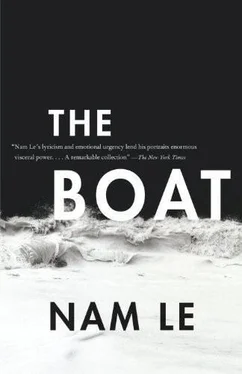"Why does it have to be about Paul?"
Parvin's face contracted. "Isn't it?"
But there it was, in her voice — the habitual undertone, the unsaid charge that had tolled out between them ever since Parvin started the radio program. That Sarah's relationship with Paul wasn't worth talking about. That it had always been a luxury, ill-used and underappreciated, which Sarah had somehow snatched from the finite resources of other women — these women — and then squandered.
"Don't worry," Sarah said. "I won't make you talk about him."
It started raining. Standing at the window, her back to the room, Parvin said, "You must be tired. Roya prepared the guest room for you." She stayed standing there. Then she added, "I always thought Paul was fine. It was you who made things unbearable for yourself."
"I'm sorry," said Sarah, "that my problems — " she broke off, her throat constricting — "that they were never as impressive as yours."
"God," said Parvin, a sneer in her voice, "you haven't changed at all." She started walking. At the door she spun around. "You know," she said, "this isn't all just make-believe for me." Her voice was unnaturally flat. "I just opened myself to you."
Sarah looked at her wretchedly, with the full force of accusation. "I know."
Parvin left. Sarah stayed and listened to the rain. She felt crushed, completely enervated. No matter where she turned- everything she touched, she ruined. Moments later-though it seemed too early to sleep-she crept out and closed the door behind her, cautiously, as though leaving a hospital ward. She went to find her bed.
***
ROYA WAS WRONG: it wasn't Paul who had broken her heart. Her heart had come already impaired. From the beginning she'd led a life of what seemed to be self-maintenance. She'd calibrated herself to be above average in all the average ways: running down the hours, the feasible commitments, the ready consolations of work and sleep. She'd built her life, elegantly, around convention — conventional aspiration, conventional success — and was continually astounded that no one saw through the artifice — no one recognized Sarah Middleton as all falsework and nothing within. Only Parvin had sensed this, she felt, and back in college had accepted Sarah into her friendship with as few questions as she wanted asked of her. It wasn't that they weren't intimate, or equal — more that Sarah, by nature, found it easiest to fall in with her, and had always been grateful for it.
Of course, Paul complicated everything. Parvin could never understand that for Sarah, being with him was, in a slanted way, like watching TV — one of the few things capable of dragging her, temporarily, to a deeper plane of living. He took her conventionality and gave it depth, luster, definition. How had that happened? Even now, her memories of him dulled everything else. Their last morning: the broad-branched maples catching and holding the last of the dew, running it down their boughs and bodies in streaming rills. How, underneath the canopy, the air was cold, below the frost point, and the cordgrass as she waded through it crackled and chinked like Christmas paper.
They broke up where, for Sarah, they'd truly begun. On their last trip to New Hampshire, in that held-breath space in a rare argument where they could be absolutely honest with each other, she'd asked — in a low voice as though to forestall any interest in his answer — whether he wanted to leave her.
He'd paused. Mulling it over, as if it were a trick question.
"Please tell me," she said. "You have to tell me. Do you?"
He said, "No." But his face had caved into a deep frown.
The next morning, ankle-deep in the wet grass, she'd thought over their life back in Portland — their shared apartment, their shared work — how it had seemed so tenable for so long. Years of her life. She turned to look at the blank-faced house and imagined him inside, asleep, buffered by his safe, solid childhood, his imperturbable parents — their mess of shared assumptions — and it occurred to her that maybe she had in fact simulated their entire relationship. Maybe she'd lived it on both sides. What did she really know about him? — about how he felt about her? The front door of the house opened and he came out swathed in one of his family bathrobes.
"Sarah?"
He crossed the back lawn in his slippers.
"It's freezing out here," he said. "Come on."
She watched him approach. The grass washed into a bright green that was full of light, that had yellow in it. Behind him, black clouds sprouting on the horizon, flying fast and low toward them, shaving the tops of trees. He stopped at the edge of the lawn. Then she saw it in his face. With a visceral hitch that was at least part relief, she thought of all the things that would happen now — the crushing logistics of moving out, parceling out property, navigating a shared workplace — all the wearying, recursive conversations she would be fated to have.
Paul took his bathrobe off and wrapped it around her. Underneath, he wore boxers and a T-shirt, and the sight of it tore her apart.
***
What had been real and what not? What must she hold onto, what release? Sarah sat on her bed, staring out into the dimly glowing night. Low gray boxlike buildings stretched away into brown slums and behind those, Mahmoud had told her, was the salt desert. Dasht-e Kavir. From out that expanse came music all night, parched, tattered — drums, always, but also fragments of a man's voice in harrowed mourning. Once Sarah heard the theme from Titanic .
In the beginning it had been terrifying. Her working life she'd spent assigning tasks to units of time; how, then, could she spend all her time not thinking about him? She quit her job, moved into her mother's house. She'd saved enough that money was never an issue. It had been far easier than she'd expected to leave work — but surviving a vacant day seemed impossible. She couldn't cast her life so far. It was a matter of hours — minutes, really, and through those minutes it had been Parvin who had talked her on, coaxed her to apprehensible distances. They'd pored over her pain together — Sarah, all the while, shirking the suspicion that her friend was now only ever present for her pain. What had been real? When had Sarah truly been happy? Here — now — in this dark villa — her life again revealed its fiber to her. Work: an overcast spread of clocked-in hours. Paul: streaks, dyed strands of memory, unraveling at every touch. To think about it now, the closest she'd ever come to real happiness had been by herself: swimming at the local indoor pool before work. She'd always liked the silence of new morning, the crisp smell of chlorine, the high stained windows that, during summer, filtered the light through like bottled honey. Sometimes, when she was first to arrive, the rectangle of unbroken water shone with the hardness and sheen of copper. She liked the companionship she shared with the other swimmers — all serious swimmers at that hour — the feeling of being alone, unrequired to commit any of the compromises required of human interaction, and yet a part of them; her mere presence the stamp of her belonging. Here she belonged. She liked standing on the blocks, goose-pimpled, second-guessing, and then the irretractable dive into cold water — the sheer switch of it against her skin — she was wet now, cold, her hair wet, and there was nothing to do but to swim herself warm. Lap after lap she would swim: pure sound and feeling; matching the rhythm of her strokes to the pace of her breathing, the ribbed circuit of air through her body. Conditioning herself into a kind of peace. Then, afterward — home.
***
SARAH WOKE FIRST THE NEXT MORNING. She ran the bath, turned the bathroom light on, then off again. The water reflecting the bone-dull sky. She slipped out of her underwear and into the cold water.
Читать дальше











